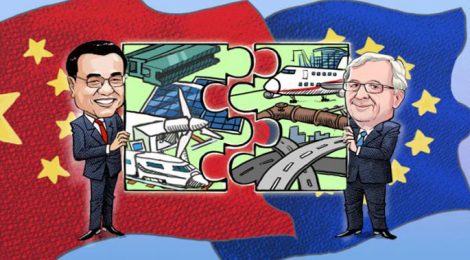
“European Chamber of Commerce in China launches Position Paper 2016/2017”
On November 22, the European Union Chamber of Commerce in China presented in Chongqing its yearly publication: the “European Business in China Position Paper 2016/2017.” Founded in 2000, the Chamber has today over 1.600 members and seven chapters, covering China’s largest cities. The Position Paper is the Chamber’s primary annual publication, awaited with particular interest by the wider community of entrepreneurs and institutions operating in China, foreign and Chinese alike. The 16th edition of the Position Paper offers this large community over 900 recommendations that draw directly from the knowledge and expertise of the Chamber’s member companies. The choice of launching the paper also in Chongqing, after the first event in Beijing, is a strong sign that Southwest China is increasingly in the spotlight of investors, entrepreneurs and institutions.
The paper’s keynote introduction was delivered by Jorg Wuttke, President of the Chamber, who presented the key themes of this edition: the ramifications of the 13th Five-Years Plan for European companies and the outlook on several reforms carried out by Beijing. The paper analysis spans through all the business domains, appraising the manufacturing industry, the trade in goods and service, and the financial sector. The aim of the paper is to provide macro level commentaries and policy recommendations to China’s policy makers – such as how the country can continue its impressive growth in the spirit of the 3rd plenum’s decision, stating that “the focus of the restructuring of the economic system (…) is to allow the market to play a ‘decisive role’ in the allocation of resources.”
From the analysis made by the Chamber of 13th Five-Years Plan, it appears that the government has an increasingly strong role in developing industries by directing capital into priority sectors established by central planners, but this will not allow China to realise its full economic potential. Open markets and more private investments are essential if China want to avoid to get stuck in the middle income trap – the economic slowdown that most fast-growing developing economies experience when they reach income thresholds comparable to that of China today. With growth rates of investments in China by privately-owned enterprises (POEs) having declined from 10,1 percent in 2015 to 2,8 percent during the first half of 2016, if the country was to provide POEs with better market access, this would certainly help addressing some of its immediate economic challenges, while also restoring investors’ confidence. And as China would be the primary beneficiary of further domestic market opening, doing so is very much in its own interests.

In fact, China has generated enormous investments flows into Europe in 2016, welcome for the creation of jobs and the related economic growth. Yet, the lack of reciprocity in market access is glaring when looking at the numerous areas where European business is prohibited, or at best restricted, from making similar investments in China. This is related to the prominent role played in China by state-owned enterprises, and to its environment characterised by numerous restrictions and high uncertainty, even inside the so-called free trade zones (FTZ). The perception is that foreigners need local support due to strict regulations for doing business in China, which is relatively easy just in few cities, like Shanghai. Interestingly, the sectors not addressed in the 11th, 12th, 13th Five-Years Plans, are generally growing very fast and are highly creative (for example payment systems, like Wechat), possibly because they are free to innovate.
This uneven situation is politically unsustainable and, for its own benefit, China should start collaborating equally by opening up markets and allowing European business to contribute more to its economy. As a matter of fact, the central government has promised to introduce reforms aimed to give greater market access to foreign-invested enterprises, attesting its importance to the national economy.
With global economic growth remaining fragile, both China and EU will suffer if China does not reach its full potential. A slow implementation of market reforms risks plunging the country into stagnation. Developing a correct understanding of market-government relations will help the country to transform its economic growth pattern and also help the government to change its functions. A metaphor proposed by Jorg Wuttke might help in framing this opportunity: Europe’s success in football is in part due to its open system, as seen in the number of players with immigrant backgrounds. China might follow the same model with foreign companies: without international cooperation and joint ventures, there is hardly any long term progress and innovation.
To conclude the presentation of the Position Paper, a debate between the President of the EU Chamber, Philippe Rehault – Consul General of Canada in Chongqing, Dominik Widmer – President of Sino-Swiss Holding AG, and Robin Niethmmer – Chairman of European Chamber for Southwest China. The president of the EU Chamber mentioned that, in addition to the laws, the problem of China’s internet restrictions needs to be considered: the difficulties in gaining access to data and information affect market access. Regarding Southwest China, Philippe Rehault highlighted the support coming from the central government to Chongqing Municipality. Such support may finally turn out to be negative, if it constricts the incentives to take on improvements, and ease the pressure to reform. Chongqing’s government should especially invest in its mid-level management representatives, which could bring much greater overall improvements. Mr Widmer recalled that currently in China there are seven new FTZ, but time may be required to make them really efficient.
To briefly sum up, the paper highlights the uncertainties which characterise some cities and regions of China and that the pace of reforms is slow and uncertain, optimism of investors is slightly decreasing, but it also connected to their field of work. The EU Chamber is doing a crucial role in providing a channel for European investors and companies to voice their needs and signals, and transmitting them to the highest decision-makers in Beijing, as well as in local governments.




